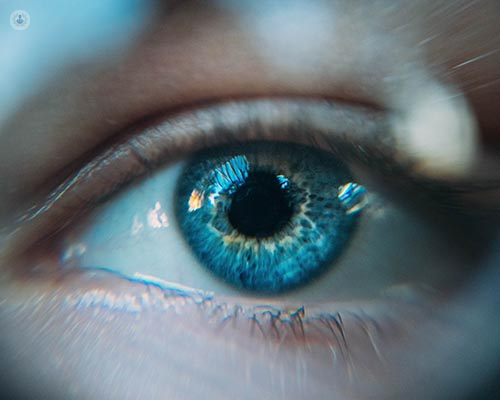Keratoconus: a comprehensive guide
Escrito por:Keratoconus is an eye condition where the cornea progressively thins and bulges into a cone shape. It distorts vision, often requiring special contact lenses or surgery for correction. Here to explain more about the condition is reputable consultant specialist optometrist Mr Don Williams, who provides a comprehensive guide.

What is keratoconus?
Keratoconus is an eye condition where the cornea, which is normally round, thins out and begins to bulge into a cone-like shape. The distortion bends light as it passes into the eye towards the light-sensitive retina, leading to vision irregularities. Keratoconus may affect one or both eyes and typically starts during adolescence or early adulthood.
What are the principal symptoms of keratoconus?
The principal symptoms of keratoconus include:
- Blurred or distorted vision.
- Increased sensitivity to light and glare.
- A need for frequent changes in eyeglass prescriptions.
- Sudden worsening or clouding of vision.
- Difficulty driving at night.
- Halos around lights.
- Double vision in one eye.
What triggers keratoconus?
The exact cause of keratoconus is unknown, but it is thought to be linked to a combination of genetic, environmental, and hormonal factors. Some possible triggers include:
- Genetic predisposition: A family history of keratoconus increases the risk of developing the condition.
- Environmental factors: Chronic eye rubbing and exposure to ultraviolet light are believed to contribute to the progression of keratoconus.
- Hormonal changes: Keratoconus often appears during puberty, which suggests that hormonal changes might play a role.
How does keratoconus progress over time?
Keratoconus typically progresses in stages over several years:
- In the early stages, the vision may be only slightly affected, and changes in vision can often be corrected with glasses.
- As the disease progresses, the cornea becomes more irregular and vision deteriorates further, making it difficult to correct with regular glasses or soft contact lenses.
- In advanced stages, the cornea can become scarred, significantly impairing vision, and making it necessary to consider surgical options for treatment.
What are the treatment options for keratoconus?
Treatment options for keratoconus vary depending on the severity of the condition:
- Spectacles or soft contact lenses: In early stages, vision can be corrected with glasses or soft contact lenses.
- Rigid gas permeable (RGP) contact lenses: As the condition progresses, hard or RGP lenses may be required to correct vision more effectively.
- Collagen cross-linking (CXL): A procedure that strengthens corneal tissue to halt the progression of keratoconus.
- Custom soft contact lenses or "scleral" and "hybrid" lenses: These are larger diameter lenses designed to cover the entire corneal surface and correct vision.
- Intacs: These are small implants inserted into the cornea to flatten the cone shape and improve vision.
- Corneal transplant: In severe cases, when vision can no longer be corrected with lenses, a corneal transplant may be necessary.
Are there any lifestyle changes or habits that can help manage keratoconus?
Yes, there are several lifestyle changes and habits that can help manage keratoconus:
- Avoid rubbing your eyes to prevent further damage to the cornea.
- You should wear sunglasses to protect your eyes from UV rays.
- Maintain regular appointments with your eye care professional to monitor the progression of the condition.
- Use prescribed eye drops or artificial tears to keep your eyes lubricated and comfortable, especially if contact lenses are used.
- Follow all care and maintenance guidelines for contact lenses to reduce the risk of infection and ensure the best vision correction.
If you would like to book a consultation with Mr Williams, simply visit his Top Doctors profile today.


